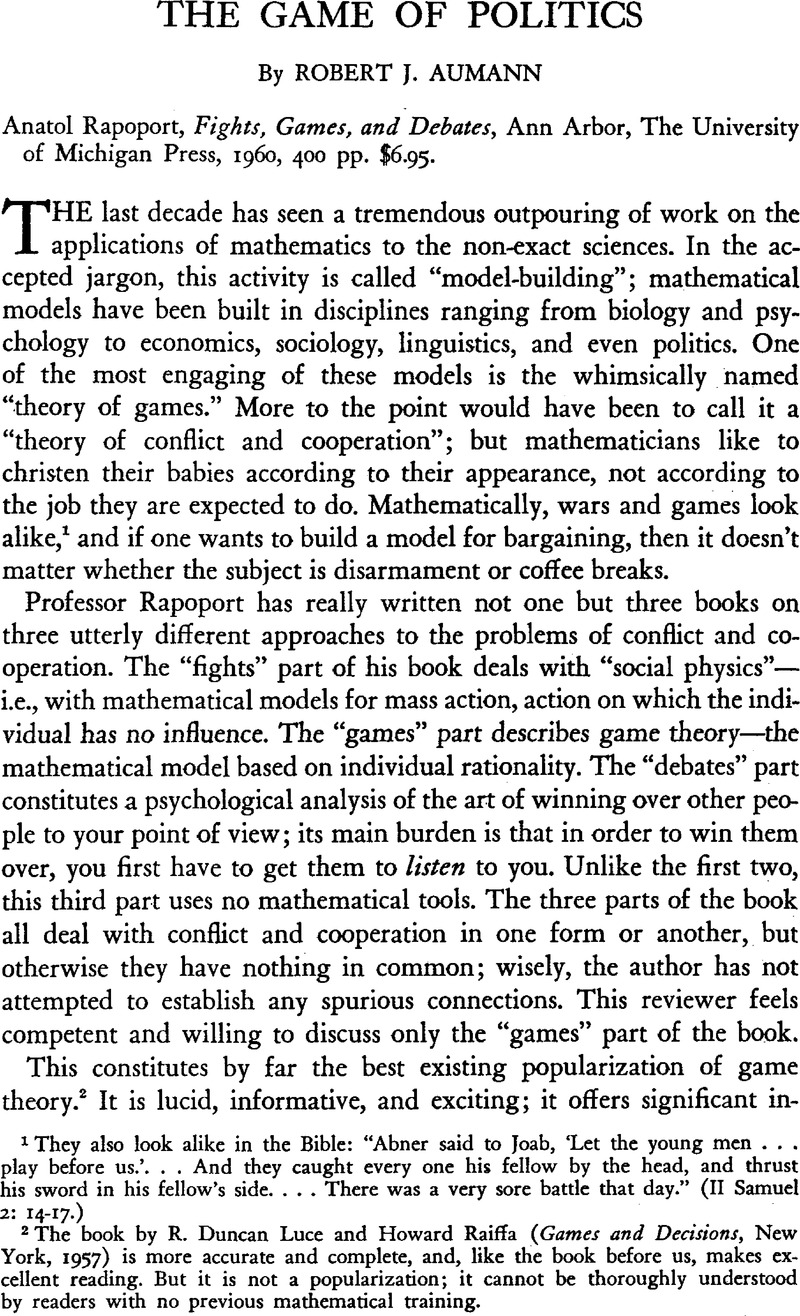Published online by Cambridge University Press: 18 July 2011

1 They also look alike in the Bible: “Abner said to Joab, ‘Let the young men … play before us.’ … And they caught every one his fellow by the head, and thrust his sword in his fellow's side. … There was a very sore battle that day.” (II Samuel 2: 14–17.)
2 The book by Duncan Luce, R. and Raiffa, Howard (Games and Decisions, New York, 1957)Google Scholar is more accurate and complete, and, like the book before us, makes excellent reading. But it is not a popularization; it cannot be thoroughly understood by readers with no previous mathematical training.
3 Decision theory is an inclusive name for all these disciplines (it includes game theory).
4 The word “politician,” which would have been more fitting, has become a “no-word.”
5 I feel obliged to express strong disagreement with the contents of the last two sections of Chapter IX (pp. 161–65), and especially with the first of these (pp. 161–63), in which the author philosophizes about the advice that is given by game theory to the players in a strictly competitive game. In fact, the reasoning behind this advice is a good deal sounder than is apparent from the discussion in these sections, which is based on serious misunderstandings of utility theory.
6 See the end of section III below for an example of this (the overproducing farmers).
7 The game was disguised somewhat by means of a set of rather complicated rules which, however, were quite transparent. Cf. Vinacke, W. E. and Arkoff, A., “An Experimental Study of Coalitions in the Triad,” American Sociological Review, XXII (1957), pp. 406–15.CrossRefGoogle Scholar
8 These need not be groups of people, but can also, for example, be groups of nations.
9 If one interprets “norm.” as in “normative”—i.e., as a standard according to which people should behave—then the phrase “norms actually operating” is devoid of sense. A physician was once asked at a murder trial how long a normal person lives. His answer was that a normal person doesn't die; medically, there is something wrong with everyone who dies.
10 Though sometimes one is forced to wonder.
11 Such as the Prisoner's Dilemma.
12 Professor R. D. Luce suggested at the Princeton University Conference on Arms Control and Limitation in October 1960 that it might be worthwhile to look for more benign equilibria in this situation.
13 No applause, please.
14 The term “prefer” is an example of an undefined entity in the mathematical model; to give the theory real-life significance, it must be translated (into its everyday meaning).
15 The significant exception is the collaboration of the economist Oskar Morgenstern with the mathematician Neumann, John von in their book, Theory of Games and Economic Behavior, Princeton, N.J., 1944.Google Scholar
16 Government-imposed or otherwise enforced acreage restrictions would be nothing new in game theory; they are the result of “arbitration” or “cooperative” procedures. The novelty of Rapoport's suggestion lies in that he obtains this result in the non-cooperative case.
17 This word doesn't really belong there. The point is not shortsightedness, but selfishness; also in the long run it is better for every individual not to be vaccinated.
18 Game theory abounds in such insights. For those familiar with the von Neumann-Morgenstern solutions, another example is that of discriminatory solutions; still another one is Shapley's index of power.
19 We are discussing decision-making in a specific situation; I think even Tolstoyites (and Marxists) would agree about the importance of personality factors in the short run.
20 This recalls the man who, as he was emerging from the subway, complained to his companion: “Damn it, it's raining again”; whereupon the companion answered, “Better than nothing.”